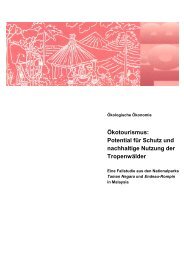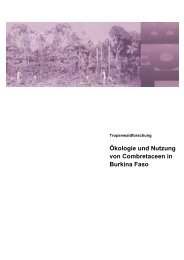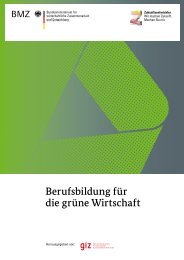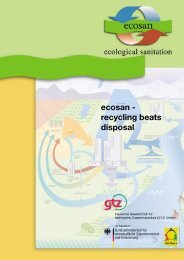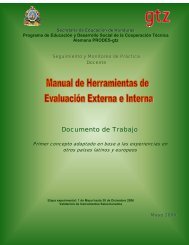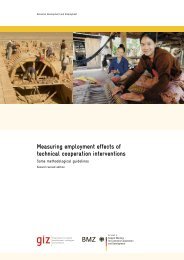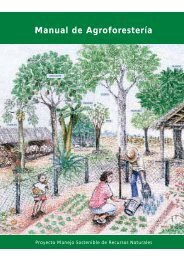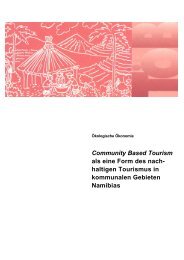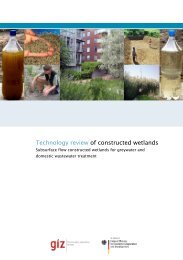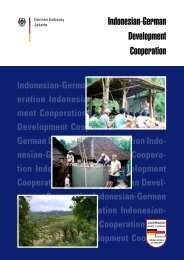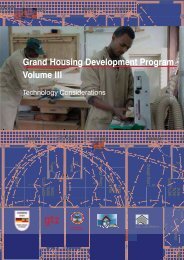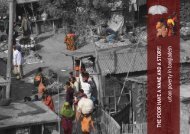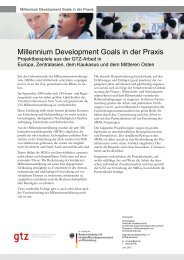Status Report on Global Neem Usage - Gtz
Status Report on Global Neem Usage - Gtz
Status Report on Global Neem Usage - Gtz
- No tags were found...
You also want an ePaper? Increase the reach of your titles
YUMPU automatically turns print PDFs into web optimized ePapers that Google loves.
2. GLOBAL NEEM DISSEMINATION AND USAGETable 2.4:Analysis of neem oil for micro-organismsMicro-organisms Permitted c<strong>on</strong>centrati<strong>on</strong> *Aflatoxin (B1, B2, G1, G2)East fungus, mould fungus and bacteriaEnterobacter, Staphylococcus aureus andPseudom<strong>on</strong>as aeruginosa.Total: 4µg/gTotal: 500 units/gNo c<strong>on</strong>taminati<strong>on</strong>* According to the regulati<strong>on</strong>s in Germany foodstuffs and cosmetic products should not c<strong>on</strong>tainmore than 4 µg aflatoxin (B1, B2, G1, G2) per kg. Three specific pathogens must not be present:Enterobacter, Staphylococcus aureus and Pseudom<strong>on</strong>as aeruginosa. Three groups of aerobicmicro-organisms are analysed together: yeast fungus, mould fungus and bacteria. The total ofthese three groups should be below 500 units per gram.The best method for obtaining a high quality oil is to mill seed of the best quality. Anotherpossibility is to filter it through a special membrane, but this method is very expensive and itis possible that the oil loses some important ingredients.When leaves and bark are used in cosmetics best quality raw material should be taken. Thebest harvesting period for high-quality leaves and bark is just after the main seed harvestseas<strong>on</strong>. This is also the best time to make a formati<strong>on</strong> cut <strong>on</strong> trees, so that leaves, twigs andbark are available automatically. As with the seeds, it is important that the harvestedmaterials are dried rapidly under clean c<strong>on</strong>diti<strong>on</strong>s. Storage c<strong>on</strong>diti<strong>on</strong>s also must be clean anddry.2.4 Evaluati<strong>on</strong> of the Questi<strong>on</strong>naire "<strong>Global</strong> <strong>Neem</strong> <strong>Usage</strong>“- General Questi<strong>on</strong>s Pertaining to <strong>Neem</strong>This chapter focuses <strong>on</strong> the results obtained <strong>on</strong> evaluating the general questi<strong>on</strong>naires, thekey emphasis being <strong>on</strong> neem usage.To enable a better comparis<strong>on</strong>, the results of the evaluati<strong>on</strong> were put into different groups.The general questi<strong>on</strong>s were grouped according to regi<strong>on</strong>s such as Asia, Africa and theCaribbean/Latin America, with the industrialised countries as a separate group. The specificquesti<strong>on</strong>s, which allowed for several resp<strong>on</strong>ses, were grouped together.The diagrams show the frequency of positive resp<strong>on</strong>ses in relati<strong>on</strong> to the number of completedquesti<strong>on</strong>naires. It has to be pointed out at this juncture that the relati<strong>on</strong> between theresp<strong>on</strong>ses received are not a fully appropriate reflecti<strong>on</strong> of the relati<strong>on</strong>s between the regi<strong>on</strong>s/countries. C<strong>on</strong>clusi<strong>on</strong>s could <strong>on</strong>ly be made as to the presence or absence of the criteriareferred to in the questi<strong>on</strong>naires. C<strong>on</strong>clusi<strong>on</strong>s as to the number of trees and their distributi<strong>on</strong>,in particular the various forms of neem usage in the given regi<strong>on</strong>s/countries, are frequentlybased <strong>on</strong> estimates by the individuals and instituti<strong>on</strong>s questi<strong>on</strong>ed.17



